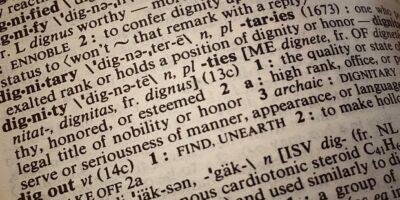What does it mean that a series’ attempt to create an authentic portrayal of higher education completely excludes adjuncts?
Corresponding Author: Emily Wortman-Wunder
Email: Emily.Wortman-Wunder@ucdenver.edu
Institutional/Organizational Affiliation: English Department, University of Colorado Denver
Abstract
The Netflix drama The Chair is refreshingly accurate in its portrayal of higher education, except in the show’s lack of adjunct faculty. The purpose of this short commentary is to reflect on how this absence is both disappointing and a missed opportunity.
The Netflix drama The Chair earned kudos in 2021 for its detailed portrait of academia and Sandra Oh’s brilliant acting. Oh plays Ji-Yoon Kim, the newly appointed chair of a beleaguered English Department in a small college. Dr. Kim is the first woman and the first person of color to hold that position, but the problems faced by the department—plummeting enrollment, a top-heavy faculty, and intergenerational tensions—make her job almost impossible. Add in a Nazi-themed misstep by one of her colleagues and her job is doomed. Most academics watched the series with delight, although adjunct Twitter was loud with protest: where were all the adjuncts (Schuman, 2021)? In this commentary I argue that the absence of this increasingly important class of university faculty both reveals and perpetuates a dangerous misunderstanding of how university education operates.
University life on screen usually gets it embarrassingly wrong: the complete absence of instructional technology in classrooms (Hanson, 2020), for example, or stadium-seat lectures given in what appear to be the professor’s private office (Falcone, 2018) and endowed professorships awarded to new PhDs (Nom de Plume, 2023). So it was refreshing to watch some of the real texture and drama of a college setting through a screen, from crumbling infrastructure to tense faculty meetings about budgets. The show’s verisimilitude made the erasure of adjuncts[1] doubly disappointing.
This erasure reflects a larger invisibility in the culture at large. Despite 68% of instructional faculty at U.S. institutions being non-tenure track (American Association of University Professors, 2018, p. 2), the standard professor in popular culture is a tweed-wearing, white-haired oldster, usually male, and typically insulated from the world by his stature as a professor with implied tenure (Carens, 2019; Dagaz & Harger, 2011). Even more informed analyses of higher education often ignore or gloss over the role of adjuncts. Recent prominent critiques of the university, from Nathan Heller’s New Yorker piece “The End of the English Major” (2023) to the Washington Post article about how non-STEM majors report higher levels of regret about their college choices (Van Dam, 2022), barely mention adjuncts, despite the importance of adjunctification to these discussions of how universities prioritize spending. The same social forces that are eroding the humanities in favor of science and engineering have led to the steady replacement of tenure track faculty with adjuncts; it’s just that one gets the headlines, while the other happens behind the scenes.
This invisibility makes sense, of course. Most screenwriters, pundits, and editors are former students, not faculty, and undergraduates are notoriously oblivious to the status differences in the people who teach them (although this remains a poorly defined area of research—see Phillips, 2022). As the writer Carmen Maria Machado, herself an adjunct, wrote of a life-changing undergraduate prof: “What I didn’t know at the time—and what I wouldn’t figure out for the better part of the next decade—was that Harvey was an adjunct. He didn’t tell us, and I didn’t know to ask. As an undergraduate, I never heard the term” (2015). Even when someone involved in a production knows better—as Annie Julia Wyman, who co-wrote The Chair after getting a doctorate from Harvard (58:38 tenure track to non-tenure track, according to the Harvard Crimson), clearly does (Hamid & Schisgall, 2023; Herman, 2021)—subplots about adjuncts get left on the cutting room floor. If, as David Resnick argues in Representing Education in Film, movies and TV help create our collective knowledge of what higher education is, this removal of the role adjuncts play in the university setting is a problem (2018).
Adjunct faculty are not interchangeable cogs. Whether they are emergency lecturers, assigned to teach a course weeks or days before it starts, or long-term contract faculty, every adjunct brings a unique set of skills and experience to the university setting. Because they lack their tenure-track peers’ insulation, they must be aware of and responsive to the shifting winds of culture both inside and outside the walls of academe. Adjuncts are also more likely than tenure-track faculty to be women or people of color (“AAUP Releases First Tenure Study,” 2022; Flaherty, 2016).
Universities that collude in the erasure of adjuncts do so at their own peril. Initially, it may help them maintain the illusion that they can provide a champagne education on a beer budget. But higher education is under fire. In 2023, 29 state legislatures introduced bills attempting to control what employees of public universities can teach or research and who universities can promote; five states introduced bills that would limit or revoke tenure (Bauer-Wolf, 2023; Lu et al., 2023). The university as an institution is in an existential crisis, and a public that believes professors to be wealthy, out-of-touch, and morally troubled is unlikely to rally in support. Embracing the diversity and scrappiness of the adjunct class could offer universities an alternate identity—perhaps one more likely to appeal to a broader public. Furthermore, by routinely offering more stability and support to their adjunct employees, acknowledging the critical and creative roles played by adjuncts in the classroom and beyond, and more equitably distributing responsibilities and compensation, universities could create institutions that are more resilient and representative. Promoting greater visibility of their adjunct faculty would be a first step.
The Chair ends with Kim succumbing to a vote of no confidence by her department. However, the sting is lessened by nominating the aging Chaucer specialist Joan Hambling (Holland Taylor) to the post. The ending is intended as a bittersweet triumph: Kim’s dream for the department may have been defeated by the system, but Hambling successfully refuses to be made obsolete (and the patriarchy is still being undermined). However, as an adjunct, it’s hard not to see her ascension as business as usual—and as another opportunity missed.
[1] I am using the more colloquial form of “adjunct” in this piece, in which the term is used to cover all forms of non-tenure-track faculty, including full-time positions on contract and temporary, part-time appointments.
References
AAUP (2022, June 27). AAUP Releases First Tenure Study Since 2004, Revealing Major Changes in Faculty Career Tracks. Insight Into Diversity. https://www.insightintodiversity.com/aaup-releases-first-study-on-tenure-since-2004-revealing-major-changes-in-faculty-career-tracks/
American Association of University Professors. (2023) Data Snapshot: Tenure and Contingency in US Higher Education. https://www.aaup.org/sites/default/files/AAUP%20Data%20Snapshot.pdf
Bauer-Wolf, J. (2023) 5 State plans to restrict faculty tenure you’ll want to watch. Higher Ed Dive. https://www.highereddive.com/news/5-state-plans-to-restrict-faculty-tenure-youll-want-to-watch/643880/
Carens, T. L. (2010). Serpents in the garden: English professors in contemporary film and television. College English, 73(1), 9-27.
Dagaz, M., & Harger, B. (2011). Race, gender, and research: Implications for teaching from depictions of professors in popular film, 1985-2005. Teaching Sociology, 39(3), 274-289. https://doi.org/10.1177/0092055X11407348
Falcone, B. (2018). Life of the Party [Film]. New Line Cinema.
Flaherty, C. (2016, August 22). More Faculty Diversity, Not on Tenure Track. Inside Higher Ed. https://www.insidehighered.com/news/2016/08/22/study-finds-gains-faculty-diversity-not-tenure-track
Hamid, R.D., & Schisgall, E.J. (2023, May 22). More than three-quarters of surveyed Harvard faculty identify as liberal. Harvard Crimson. https://www.thecrimson.com/article/2023/5/22/faculty-survey-2023-politics/
Hanson, C. (2000) Wonder Boys [Film]. Paramount Pictures.
Heller, N. (2023, February 27). The End of the English Major. The New Yorker. https://www.newyorker.com/magazine/2023/03/06/the-end-of-the-english-major
Herman, A. (2021, August 24). The Harvard PhD Turned Screenwriter Behind Netflix’s Hit ‘The Chair’. The Ringer. https://www.theringer.com/tv/2021/8/24/22638728/the-chair-netflix-annie-julia-wyman-amanda-peet
Lu, A., Elias, J., June, A.W., Charles, J.B., Marijolovic, K., Roberts-Grmela, J., and Surovell, E. (2023, Apr 7). DEI Legislation Tracker. The Chronicle of Higher Education. https://www.chronicle.com/article/here-are-the-states-where-lawmakers-are-seeking-to-ban-colleges-dei-efforts
Machado, C.M. (2015, March 25). O Adjunct! My Adjunct! The New Yorker. https://www.newyorker.com/books/page-turner/o-adjunct-my-adjunct
Nom de Plume. (2023, February 16). Re: is your field accurately portrayed in movies and on TV? Ask A Manager. https://www.askamanager.org/2023/02/is-your-field-accurately- portrayed-in-movies-and-on-tv.html#comments
Phillips, J. (2022, January 31). Why Is My Professor Working at Two other Universities?
Awareness of Adjunct Labor Among College Students. [Guest Post] Academe Blog. https://academeblog.org/2022/01/31/why-is-my-professor-working-at-two-other-universities-awareness-of-adjunct-labor-among-college-students/
Resnick, D. (2018). Representing Education in Film: How Hollywood Portrays Educational Thought, Settings, and Issues. Palgrave MacMillan.
Schuman, R. [@pankisseskafka] (2021, August 21). Where are the adjuncts on The Chair?
[Tweet] Twitter. https://twitter.com/pankisseskafka/status/1429243832890056704
Van Dam, A. (2022, Sept 2). The most regretted (and lowest-paying) majors. The WashingtonPost. https://www.washingtonpost.com/business/2022/09/02/college-major-regrets/
Bio
Emily Wortman-Wunder is the author of Not a Thing to Comfort You, winner of the 2019 Iowa Short Fiction Award and the Colorado Book Award. Her essays and stories have appeared in Guernica, the Kenyon Review, Creative Nonfiction, and elsewhere. She teaches scientific writing at the University of Colorado Denver and is a member of the Adjunctification board and a fiction editor for Copper Nickel.
Correspondence
Email: Emily.Wortman-Wunder@ucdenver.edu





